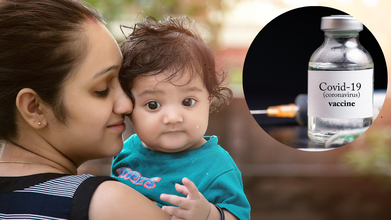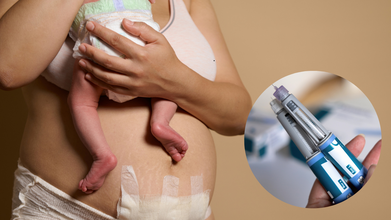- Health Conditions A-Z
- Health & Wellness
- Nutrition
- Fitness
- Health News
- Ayurveda
- Videos
- Medicine A-Z
- Parenting
Covid Vaccine Shortage Puts Children Under 12 at Risk Across the US, Parents Struggle

Credits: Canva
COVID-19 vaccine hunt for young children in the US has now become a task, as pharmacies and pediatricians' offices struggle to stock age-appropriate doses. Thanks to the regulatory confusion and limited supply. The New York Times reports that with the latest round of COVID shots and its availability for adults, many parents are now facing a dead end to secure vaccines for their children, especially those under 12.
What Is The Confusion All About?
The Food and Drug Administration (FDA)'s restricted approval that limited new Covid vaccine authorizations to adults who are 65 and older or those with high-risk conditions has led to this confusion. Furthermore, the Centers for Disease Control and Prevention (CDC)'s broader recommendation weeks later that allowed anyone over six months to get vaccinated in consultation with doctor further fueled the confusion.
There is a lack in guidance, along with logistical and contractual hurdles, which has left many pediatric offices, and pharmacies, without appropriate pediatric doses. This gap is now frustrating parents across the country.
A Confusion That Triggered The Shortage
It was in August, when FDA updated its COVID vaccines recommendations, but only for older adults and individuals with underlying conditions. The move excluded children and thus created uncertainty among healthcare providers about whether children are liable to have the vaccines administered.
A few weeks after this, the CDC also issued its own recommendation stating that new shots could be offered to anyone aged six months and older, provided the decision is made after consulting a doctor. However, the agency's acting director did not sign off the recommendation until two weeks later. This created a window for confusion, making many healthcare providers unsure of the safety of vaccines for children.
Why Was There Confusion?
The confusion was created also because of the different formulation and smaller doses that children under 12 require in contrast with adults. The delay thus left many providers hesitant to order vaccines. For instance, Pfizer's updated shot was approved only for children aged five and above, which made Moderna as the only options for infants and toddlers.
The representatives of both the companies, as reported by the NYT say that supply is not the issue as doses exist, the issue is the regulatory uncertainty and low perceived demand, which have kept the healthcare provider from placing order.
The Dilemma That Pediatricians Are Going Through
Some pediatricians are reluctant to offer vaccines until the federal guidance are finalized, this is due to their liability concerns. One Virginia pediatric practice told parents that offering shots before the final CDC confirmation could raise questions of malpractice. “It is very unusual for doctors to have to navigate a disagreement between the recommendations of the CDC and the American Academy of Pediatrics,” said Dr. Thomas Nguyen, a pediatrician in Canton, Ohio, adding that the uncertainty delayed his clinic’s decision to place vaccine orders, as reported by the NYT.
Even among the clinics that did order vaccines, the distribution is slow. Dr. Nguyen said his team placed a “small order” with Moderna on September 11, but it took nearly two weeks for the doses to arrive.
The Plight of Parents
Some of the parents who spoke to the NYT reveled their frustration and struggles, across the US.
In Chicago, Jill Schwartz has spent weeks trying to find vaccines for her three young children, aged 1, 3, and 5. “I tried their pediatrician’s office, a clinic, and multiple pharmacies — no luck."
In Womelsdorf, Pennsylvania, Rebecca Seidel said she called three different CVS locations after being told none had pediatric doses. When she reached out to her pediatrician, she was simply referred back to CVS.
In Portland, Maine, Leigh Bullion said she called a dozen providers before finding a pharmacy nearly 20 miles away that had pediatric appointments available. “It’s just like a nightmare,” she said.
Some parents like Caitlin Smith in Santa Fe, New Mexico, have spent weeks calling pharmacies and pediatricians across their city. She finally secured appointments for her children after more than three weeks of searching, only to learn the pharmacy had received just 10 pediatric doses. “It feels like the system for pediatric Covid vaccines is designed on the assumption that parents are vaccine-hesitant,” she said. “It’s extraordinarily frustrating for parents who are not hesitant and want to protect our kids.”
Older, Younger or Middle Child: Does Birth Order Shape Your Personality?

Credits: iStock
Are you a younger sibling in your family and you relate to other younger siblings? Do you feel some of your habits and traits match other younger siblings? Or are you the middle child and you feel that sometimes you are excluded. When you talk about it, other middle children also agree with you. If this is the case with you, then you may be interested to know the Birth Order Theory.
This theory was developed by Alfred Adler in 1964, who focused on the importance of birth order on personality development. In this theory, he says that though children may be born into the same household, their birth order greatly influence their psychological development.
As per Adler's birth order theory, a child could have certain personality traits which are as followed:
- The Oldest Child: more authoritarian, and feels powerful due to high expectations set by the parents
- The Youngest Child: treated like a spoiled baby and cannot rise above the other siblings
- The Middle Child: even tempered, but has trouble fitting in as they have always been sandwiched between the younger and the older siblings
However, for middle child, their characteristics would often get itself a term, called the Middle Child Syndrome.
What Exactly Is A Middle Child Syndrome And What Sets Them Apart From Their Younger And Older Siblings?
Middle child syndrome is the belief that middle children are excluded, ignored, and neglected because of their birth orders.
People often talk about “middle child syndrome,” the idea that the child who is neither the oldest nor the youngest develops a very particular personality. While some of this comes from family dynamics rather than science, many families do notice certain patterns.
Personality Traits
Middle children sometimes feel overshadowed by their siblings. The oldest is often seen as responsible and strong-willed, while the youngest gets extra attention for simply being the baby of the family. The middle child may end up somewhere in the middle of all this, which can make them quieter, more even tempered, and sometimes unsure of where they fit in.
Family Relationships
When it comes to parents, middle children might feel that they do not get the same level of attention as their siblings. The older child usually carries more responsibility, and the younger child often gets extra care and protection. The middle child may feel they slip through the cracks and receive less one-on-one time with their parents.
Sibling Rivalry
Feeling unseen can spark a sense of competition. Many middle children find themselves competing for attention from both parents and siblings. At the same time, they often become the peacemaker of the family simply because they are used to being in the middle of everything.
Feeling Left Out of Favoritism
When parents unintentionally favor the oldest for their achievements or the youngest for their sweetness, the middle child may feel they are no one’s first pick. They are not the trailblazer or the baby, and this can shape how they see their place in the family.
Carrying These Feelings Into Adulthood
Some people believe that these early experiences can follow middle children into adulthood. If a middle child grew up feeling overlooked, they might struggle with co dependency or constantly try to keep the peace in relationships. They may also find it difficult to believe they can be someone’s closest friend or favorite person.
Their personalities often seem muted when it is compared to the other siblings, this is because they have always blended into the background. These patterns can show up at work, in friendships, and in romantic relationships.
What Research Actually Shows
Although middle child syndrome is talked about a lot, scientific research has not clearly confirmed it. There have been studies that show some truth to the theories, while others deny. Some research suggests that middle children do feel less close to their parents or are less likely to turn to their parents when they are going through stressful times in their lives. A 2019 study showed that middle children were less likely to feel comfortable talking to their parents on topics like sex education. Though it is important to note that this is a broad topic to begin with, and could have cultural variations.
Other studies have suggested they might be less family oriented or more prone to certain perfectionistic traits. But these findings are not consistent across research. In fact, a number of large studies show no strong link between birth order and major personality traits such as extraversion, emotional stability, or agreeableness.
Some studies even contradict each other entirely. For instance, one study suggested middle children might have a higher risk of depression, while another found that oldest children were more likely to experience mental health issues.
So Does Middle Child Syndrome Exist?
With so many conflicting findings, scientists cannot say for sure. Many experts believe that personality is shaped by a mix of family environment, parenting styles, cultural background, and individual temperament. Birth order may play a small role, but it is unlikely to be the determining factor.
In short, middle child syndrome is more of a popular idea than a proven scientific fact. Each child’s experience is unique, and many different influences shape who we become.
More New Moms Turning to Ozempic After Birth, But Experts Are Worried

Credits: iStock
Danish researchers were studying the use of medicines on women during and after pregnancy. What they realized is that number of women consuming Ozempic and Wegovy after childbirth has increased. As per their observation, in 2018, less than 5 prescriptions for every 10,000 women post six months of their childbirth were there. However, this number increased to 34 in mid-2022, and by mid-2024, there were 173 prescriptions.
That comes close to 2 percent of all postpartum women. Most of these women were in their 30s, had more than one child, and while many were overweight, they did not have diabetes. They also had no previous history of using GLP-1 medications.
This spike surprised researchers because the postpartum phase is usually a time when the body naturally sheds some pregnancy weight and undergoes major hormonal changes. “In a period characterized by natural weight loss and marked hormonal change, this was unexpected,” said Mette Bliddal, a pharmacologist at the University of Southern Denmark and the study’s first author, as reported by the New York Times. The findings were published in JAMA.
How Was The Study Conducted?
The analysis reviewed 382,277 pregnancies in Denmark from early 2018 through June 2024. Researchers used national health registries to track every live birth and every prescription filled for GLP-1 drugs during the postpartum period. This made it possible to see the rise in real time.
Although semaglutide, the ingredient in Ozempic and Wegovy, is widely used for weight loss, its safety in the months after childbirth is still unclear. This is a time when many mothers are breastfeeding and adjusting to changing hormone levels, sleep disruptions, and recovery from pregnancy.
What We Know and Don’t Know About Breastfeeding Safety
Right now, evidence around the safety of GLP-1 drugs for breastfeeding mothers is very limited. While semaglutide has not been detected in measurable amounts in breast milk and no immediate negative effects have been seen in infants, researchers caution that long-term effects on a baby’s metabolism, growth, or pancreas remain unknown.
Major medical groups are also hesitant to give a firm recommendation. The American College of Obstetricians and Gynecologists has not released guidelines because the drugs are too new and the data isn’t strong enough. First Exposure, a Canadian research network that evaluates drug safety in pregnancy and breastfeeding, advises against using these medications while breastfeeding. They also recommend stopping them one to two months before trying to conceive.
Experts say the caution comes from the lack of solid research. GLP-1 drugs are large molecules that usually do not transfer easily into breast milk and would likely break down in a baby’s stomach. Still, the uncertainty is significant enough that researchers prefer mothers avoid them during breastfeeding.
Why Researchers Are Concerned
Another concern is that these appetite-suppressing medications could affect milk production, nutrient content, or even leave mothers dehydrated. Dr. Bliddal noted that the postpartum period is a time when “the body is working hard to regain its balance.” Without knowing how weight loss drugs interact with these processes, many specialists believe it is safer to avoid them until more is known.
Even small changes in breast milk composition could matter for infant development. Since there is no clear data on how GLP-1 drugs might alter fat content or nutrients in breast milk, researchers urge caution.
Vanessa Hudgens Becomes Mother Again At 36; Is Late Pregnancy Safe For Women?

Credits: Instagram
Vanessa Hudgens at the age of 36 is a mother again. She welcomed her second baby with husband Cole Tucker. The news was announced on Instagram on Saturday, where she shared a photo of herself lying in a hospital bed, holding Tucker's hand.
She wrote: "Well…. I did it. Had another baby!! What a wild ride labor is. Big shout out to all the moms. It’s truly incredible what our bodies can do ❤️."
This month itself, Catherine Paiz revealed that she was pregnant with her fourth baby at the age of 35.
These news of celebrity pregnancy after 30 spark the spotlight on late motherhood and how safe it really is?
What Does The Data Tell Us On The Trend Of Late Motherhood?
The average age of mothers in the US have continued to rise, a new report released on June 13 by the National Vital Statistic System (NVSS), provides the shift in age trends between 2016 and 2023. The study, conducted by Andrea D. Brown, Ph.D., M.P.H., and her colleagues at the National Center for Health Statistics.
The researchers found a clear increase in the mean age of mothers at the time of their first birth. In 2016, the average age of a first-time mother was 26.6 years. By 2023, this had risen to 27.5 years — nearly a full year’s difference in just seven years.
But the trend isn’t limited to first-time mothers. In Paiz's case, she is having her fourth child at 35.
Is Late Pregnancy Healthy?
The National Institute of Health (NIH), US (2022), 20% of women in the US are now having their first child after the age of 35. While it is the new trend, the NIH doctor Dr Alan Decherney, a fertility expert explains that "As women age, they are still fertile, but their odds of pregnancy are decreased because they are not making as many good eggs that will fertile and divide normally and turn out to be an embryo."
After age 30, a woman's fertility decreases ever year, notes the NIH July 2022 issue. It notes: "The number and quality of her eggs goes down until she reaches menopause."
However, experts do point out that getting pregnant in your 30s need not be a stressful affair at all times. As it is at this age when you experience more stability, and also someone you know who have a personal experience in handling one. Most important, you are more mature at this age, which you may not be in your 20s.
What Must You Keep In Mind If You Plan Pregnancy After 30?
Quit Habits: If you are a smoker, or consume alcohol, this is a good time to leave it.
Reduce Stress: While pregnancy for some can bring stress, try to find activities that help you release it.
Healthy Weight: Ensure that your weight is right, reduce your waist to bring it to a healthy range for a healthy pregnancy.
Food Habits: Stop eating junk and start eating more whole grains.
Exercise: A sedentary lifestyle can impact negatively on the child. You do not have to do HIIT, however, regular easy workouts can make both the pregnancy and delivery easy.
Dr Michelle Y Owens, professor of obstetrics and gynecology and a practicing maternal-fetal medicine specialist at the University of Mississippi Medical Center in Jackson, writes for the American College of Obstetricians and Gynecologists (ACOG) that "the longer your eggs have been around, the more likely they are to produce a pregnancy with a chromosome problem that can lead to a condition like Down syndrome. The risk goes up significantly after 35." However, she says, there is a good news. Now, we have tools to detect and respond to pregnancy complications early.
© 2024 Bennett, Coleman & Company Limited

